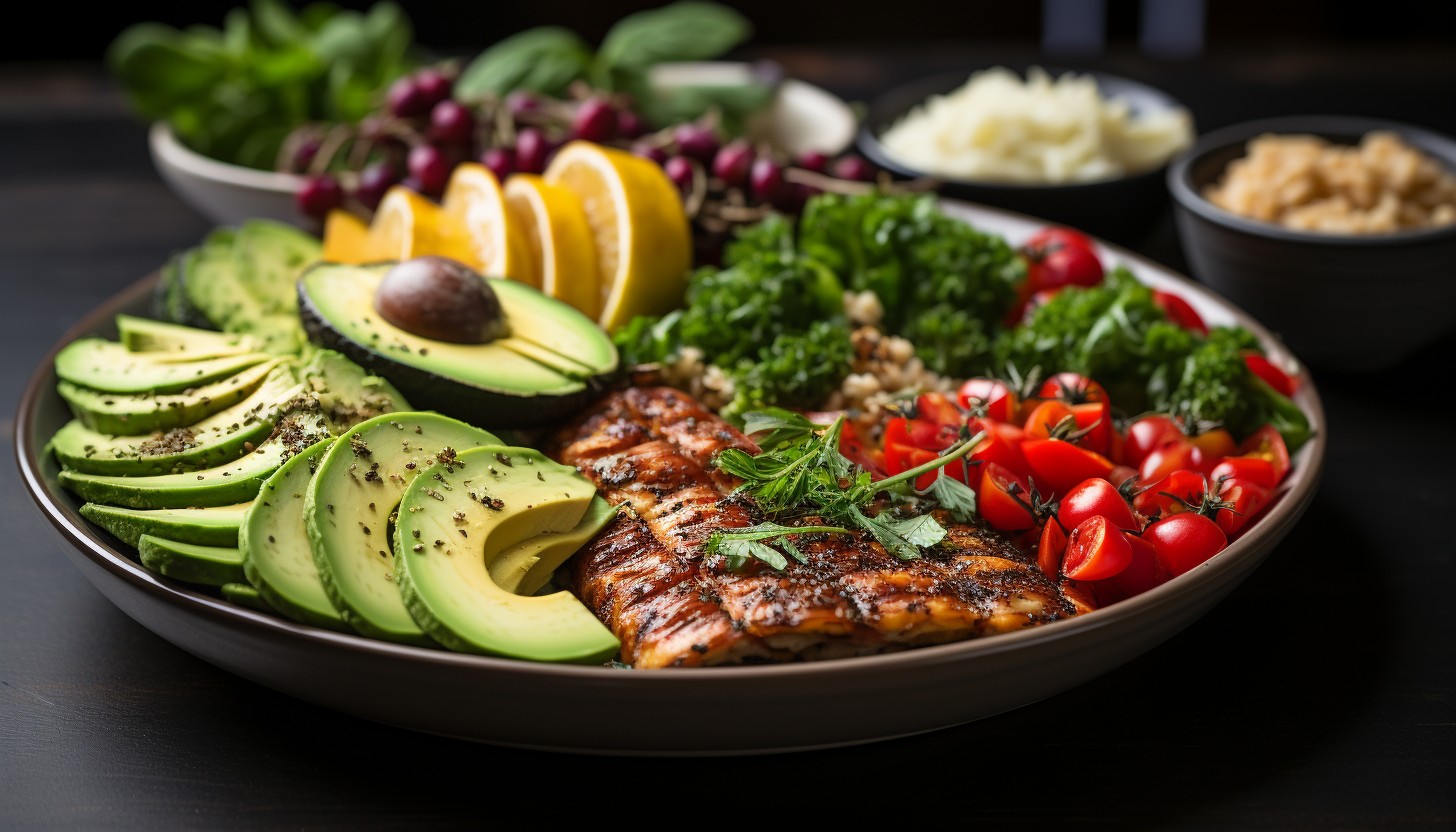Nutrition for Runners: Balancing Calories and Energy Expenditure

Are you a runner looking to optimize your performance? Well, look no further! In this article, we’ll delve into the world of nutrition for runners and explore how you can balance your calorie intake with your energy expenditure.
By understanding the concept of energy balance and calculating your specific caloric needs, you’ll be able to fuel yourself effectively for those long runs.
We’ll also discuss the role of macronutrients, timing and composition of meals, and hydration strategies that will take your running game to the next level.
So lace up those shoes and get ready to conquer the pavement with proper nutrition!
Understanding Energy Balance

Understanding energy balance is crucial for runners to optimize their performance and maintain a healthy weight. Energy balance refers to the relationship between the calories you consume through food and beverages and the calories you expend through physical activity. It’s important for runners to find a balance between these two factors in order to fuel their workouts effectively while also ensuring they don’t consume excess calories that can lead to weight gain.
One key component of energy balance is metabolic rate, which is the number of calories your body needs to perform basic functions like breathing, circulating blood, and maintaining body temperature. Your metabolic rate can be influenced by factors such as age, gender, genetics, muscle mass, and activity level.
To maintain energy balance as a runner, it’s important to eat enough calories to support your training but not so many that you exceed your energy needs. Calculating your caloric needs can help you determine how much you should be eating each day. In the next section, we will explore different methods for calculating caloric needs for runners.
Calculating Caloric Needs for Runners

To accurately calculate how many calories you need as a runner, first determine your average daily energy expenditure. This is the total amount of energy your body uses in a day, including activities like running. Once you have this number, you can calculate your caloric intake based on your training intensity.
Here are four key points to consider when calculating your caloric needs:
1. Determine your Basal Metabolic Rate (BMR): This is the number of calories your body needs at rest to maintain basic bodily functions. Use an online calculator or consult with a professional to find this value.
2. Factor in Physical Activity: Estimate how many additional calories you burn through exercise and adjust accordingly. As a runner, it’s important to consider both the duration and intensity of your runs.
3. Consider Training Goals: If you’re training for a race or looking to improve performance, you may need more calories to support increased training demands.
4. Listen to Your Body: Pay attention to hunger cues and energy levels throughout the day. Adjusting caloric intake based on hunger and fatigue can help ensure that you’re adequately fueling yourself for optimal performance.
The Role of Macronutrients in Fueling Performance

The role of macronutrients in fueling performance can’t be understated for runners. Proper nutrition is essential to support the demands of training and promote optimal performance. Two key macronutrients that play a crucial role in running are protein and carbohydrates.
Protein is well-known for its role in muscle repair and recovery. After a run, your muscles undergo damage and breakdown, and adequate protein intake helps to rebuild and repair them. Aim for about 20 grams of high-quality protein within 30 minutes after your workout to maximize recovery.
Carbohydrates, on the other hand, provide the primary source of energy for endurance activities like running. Carbohydrate loading before long runs or races can help boost glycogen stores in your muscles, delaying fatigue during exercise. A simple way to ensure you’re consuming enough carbohydrates is by following the “plate method.” Fill half of your plate with carbs such as whole grains, fruits, or starchy vegetables.
Here’s a visual representation of how these macronutrients contribute to fueling performance:
| Macronutrient | Role |
|---|---|
| Protein | Muscle repair and recovery |
| Carbohydrates | Energy source for endurance activities |
To optimize your running performance, prioritize both protein intake for recovery and carbohydrate loading before long runs or races. Remember, proper nutrition is key to achieving your goals as a runner.
Timing and Composition of Pre- and Post-Run Meals

For optimal performance, it’s important for runners to consider the timing and composition of their pre- and post-run meals. Proper nutrition can enhance energy levels, aid in muscle recovery, and optimize overall performance.
Here are four key factors to consider when fueling before and after your run:
1. Timing is crucial: Aim to eat a balanced meal or snack 1-2 hours before your run to ensure adequate digestion. This will provide you with the necessary fuel without causing discomfort during exercise.
2. Pre-run fueling: Prioritize carbohydrates for quick energy release. Opt for easily digestible options such as oatmeal, bananas, or whole grain toast. Add a source of protein like yogurt or nut butter to promote muscle repair.
3. Post-run recovery: Refuel within 30 minutes of finishing your run to replenish glycogen stores and kickstart the recovery process. Include both carbohydrates and protein in this meal or snack, such as a fruit smoothie with added Greek yogurt or a turkey sandwich on whole wheat bread.
4. Hydration matters: Don’t forget about fluid intake! Before your run, drink enough water to stay hydrated throughout your workout. Afterward, rehydrate with water or electrolyte-rich beverages like coconut water.
By paying attention to these aspects of pre- and post-run nutrition, you can optimize your performance, enhance recovery, and support overall well-being as a runner.
Happy running!
Hydration Strategies for Optimal Running Performance

Don’t underestimate the importance of staying hydrated during your runs to maximize your performance. Hydration plays a crucial role in maintaining optimal bodily functions and preventing dehydration, which can have detrimental effects on your running performance. When you run long distances, especially in hot and humid conditions, you lose significant amounts of water through sweat. This loss of fluids can lead to electrolyte imbalances and hinder your ability to perform at your best.
To understand the significance of hydration during long distance runs, let’s take a look at this table:
| Electrolyte Replacement | Importance |
| Sodium | Helps maintain fluid balance and nerve function |
| Potassium | Aids in muscle contraction and prevents cramping |
| Magnesium | Supports energy production and muscle function |
As you can see, proper electrolyte replacement is essential for maintaining proper bodily functions during exercise. Along with electrolytes, it is vital to replenish lost fluids by drinking enough water before, during, and after your runs. Aim to drink about 8-10 ounces (240-300 mL) every 20 minutes while running.
Remember that everyone’s hydration needs may vary based on factors such as body size, sweat rate, weather conditions, and duration of the run. Listen to your body’s thirst cues but don’t wait until you feel thirsty; be proactive about hydrating yourself regularly.
Conclusion
So there you have it, runner. You’ve learned all about the importance of balancing calories and energy expenditure in your nutrition plan.
By understanding energy balance and calculating your caloric needs, you can fuel your performance effectively.
Remember to focus on the right macronutrients for optimal results and pay attention to the timing and composition of your pre- and post-run meals.
And don’t forget to stay hydrated! As they say, ‘You can’t run on empty.’
So take care of yourself, fuel up properly, and keep chasing those running goals!






